Abstract
Thirteen isolates of Nocardia caviae from 12 different clinical sources were received and identified over a 5½-year period by the Mycology Division of the Center for Disease Control. The results of morphological, biochemical, and physiological studies on these isolates were compared with those obtained with four reference cultures of N. caviae received from the Institute of Microbiology, Rutgers University. Comparison showed that N. caviae isolates form a homogeneous group that is usually easily distinguished from N. asteroides, N. brasiliensis, and other pathogenic aerobic actinomycetes. The clinical sources included nine human and two animal infections and one human isolate apparently not associated with disease. Previous reports of N. caviae infections in man have been limited to rare cases of actinomycotic mycetoma. Among the human infections reported in this series are one case of mycetoma, one case of “mycotic” keratitis, one case of skin abscess, two cases of osteomyelitis, and four cases of serious pulmonary infection caused by N. caviae.
Full text
PDF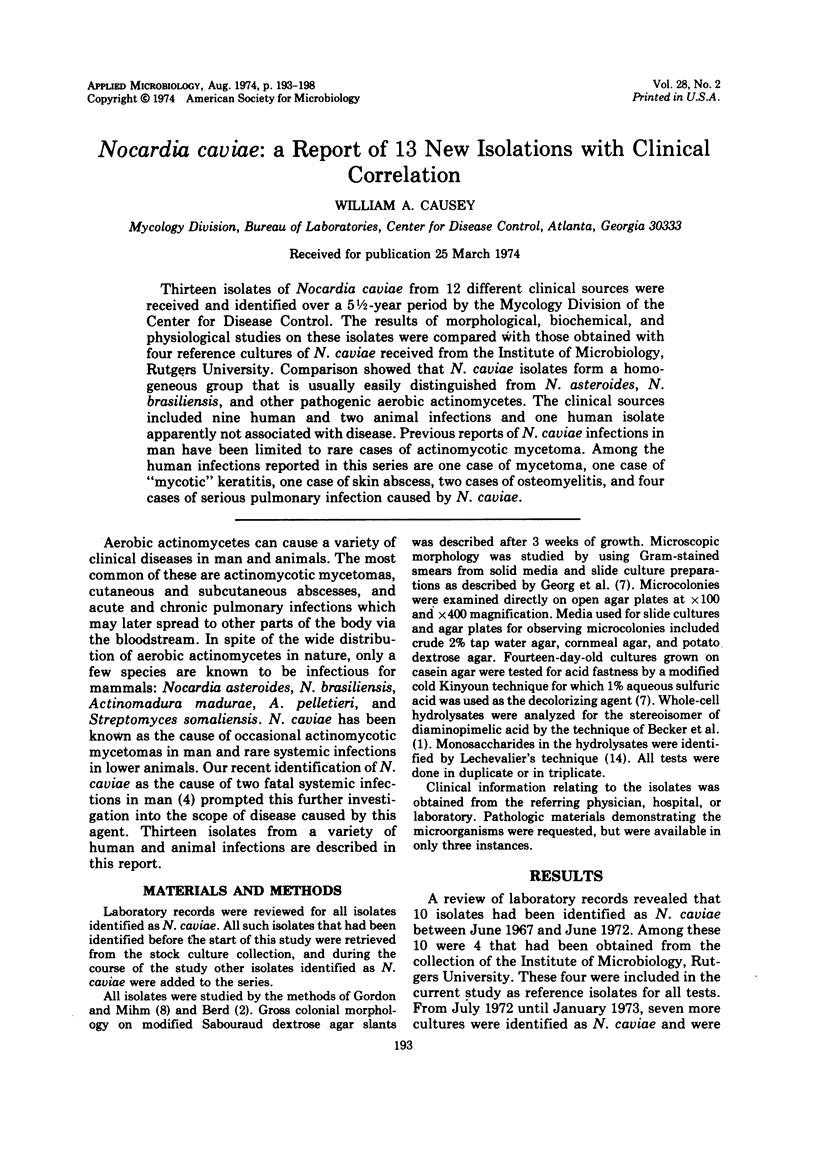
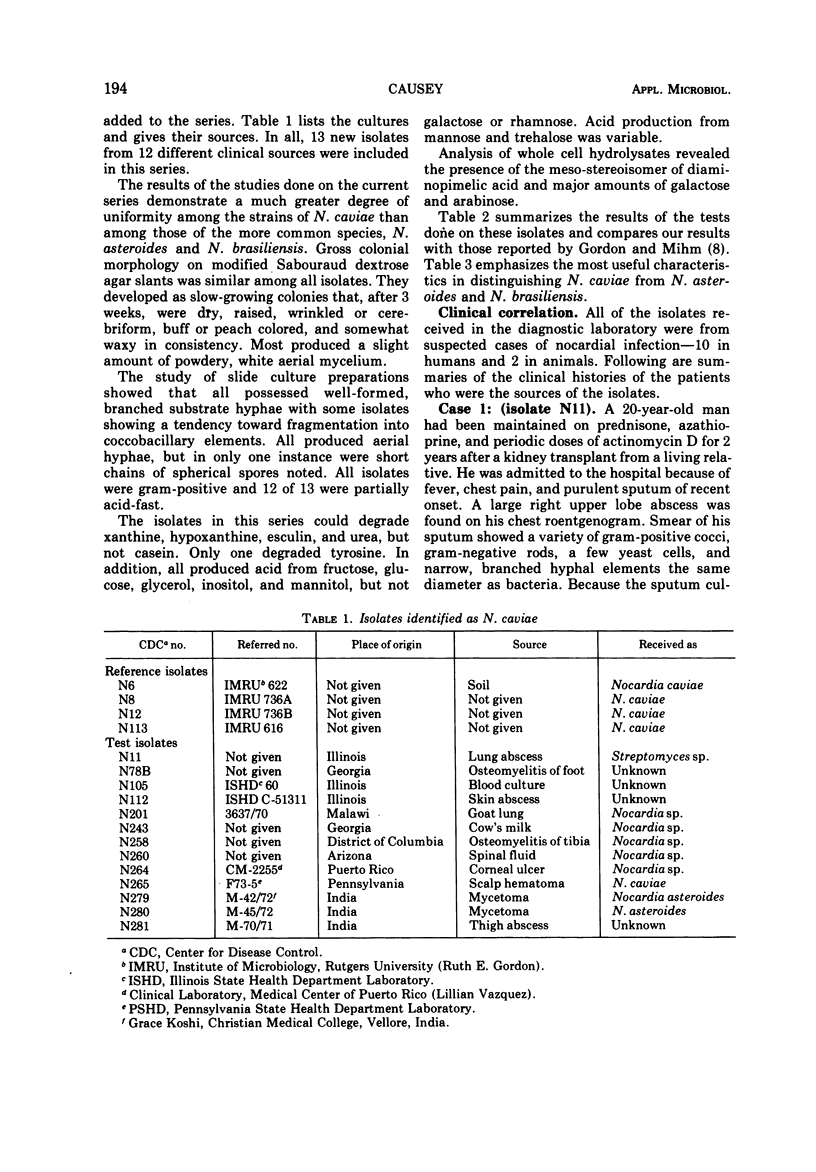
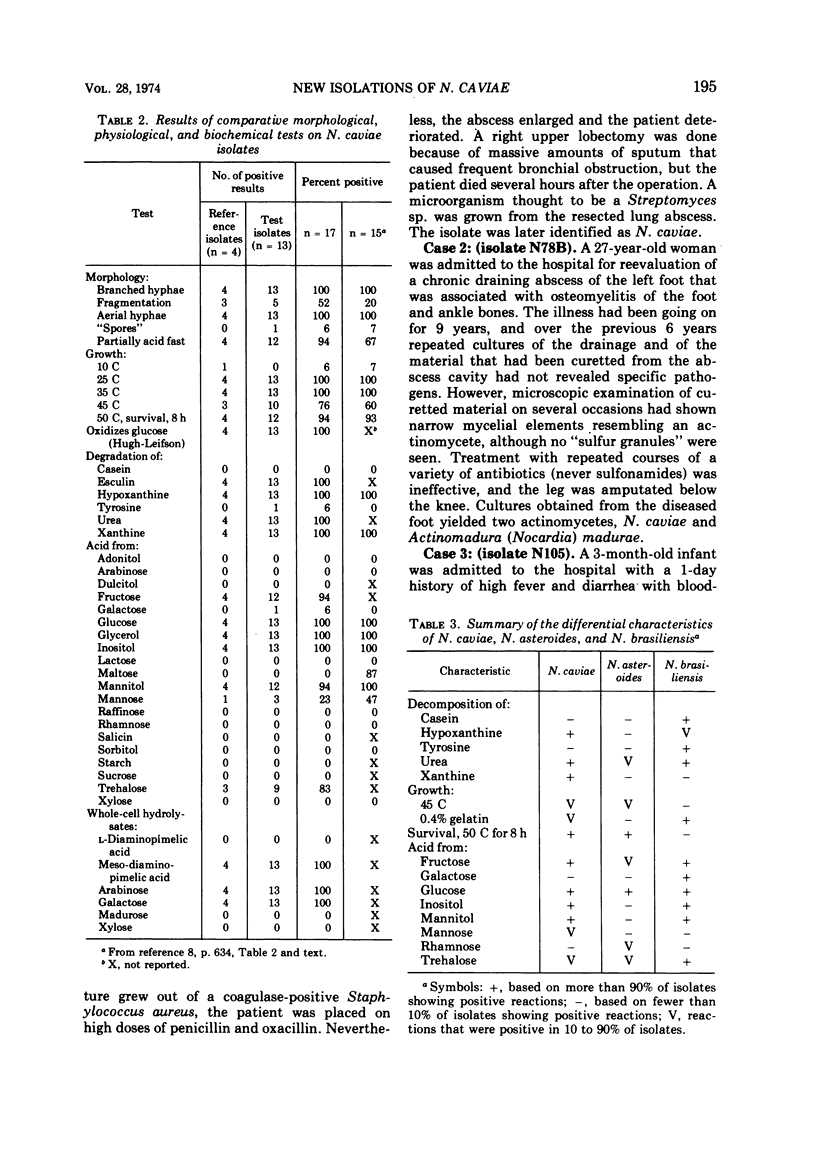
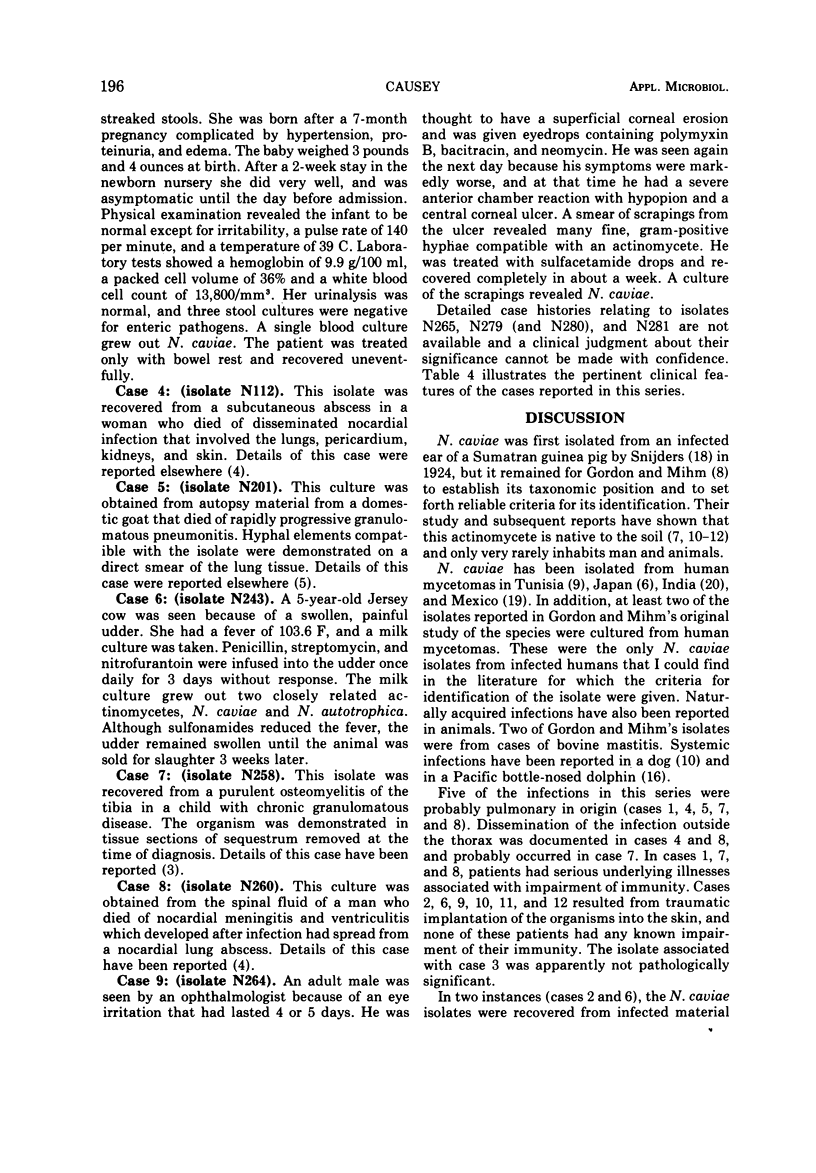
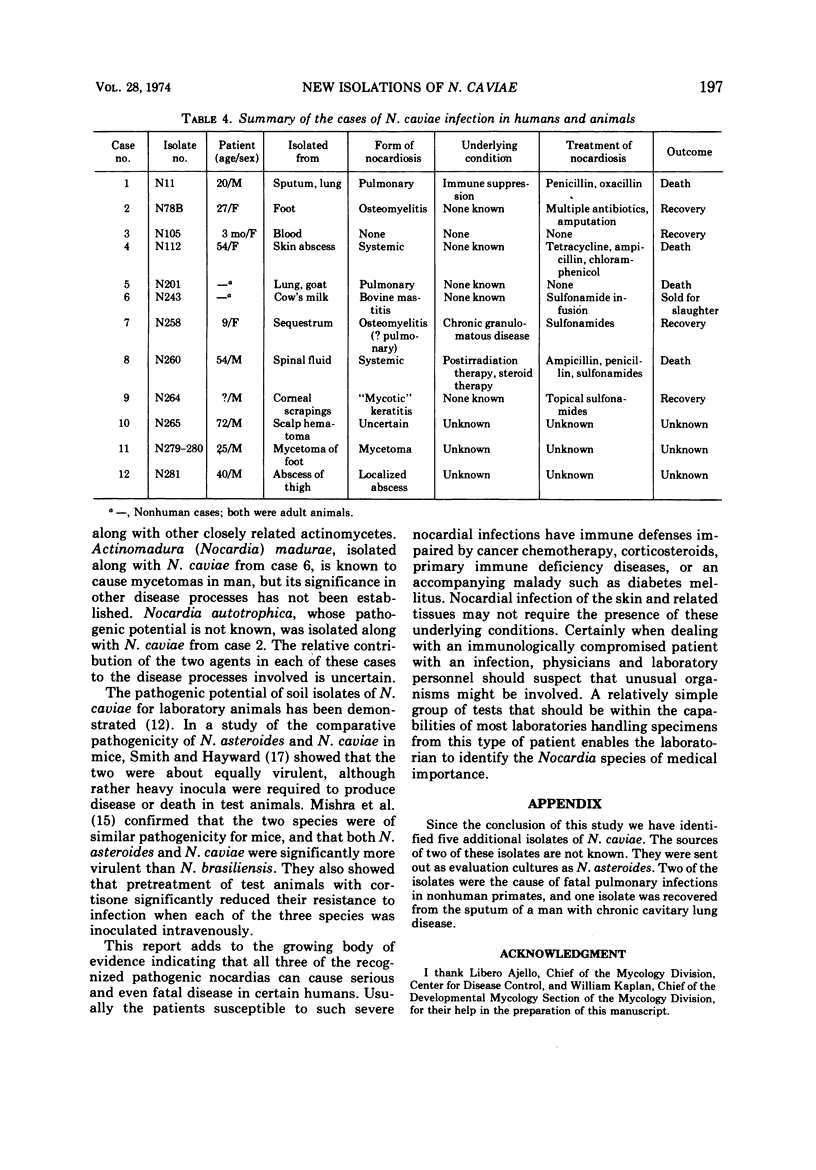
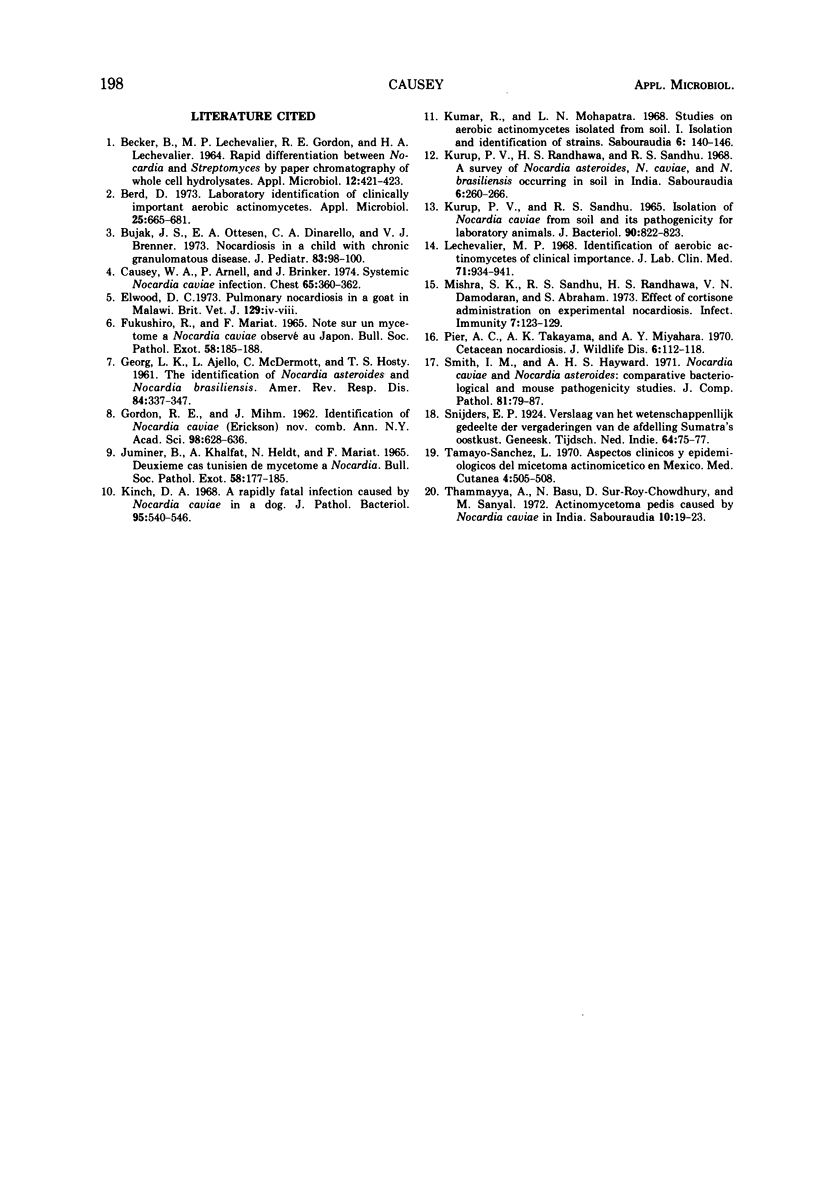
Selected References
These references are in PubMed. This may not be the complete list of references from this article.
- BECKER B., LECHEVALIER M. P., GORDON R. E., LECHEVALIER H. A. RAPID DIFFERENTIATION BETWEEN NOCARDIA AND STREPTOMYCES BY PAPER CHROMATOGRAPHY OF WHOLE-CELL HYDROLYSATES. Appl Microbiol. 1964 Sep;12:421–423. doi: 10.1128/am.12.5.421-423.1964. [DOI] [PMC free article] [PubMed] [Google Scholar]
- Berd D. Laboratory identification of clinically important aerobic actinomycetes. Appl Microbiol. 1973 Apr;25(4):665–681. doi: 10.1128/am.25.4.665-681.1973. [DOI] [PMC free article] [PubMed] [Google Scholar]
- Bujak J. S., Ottesen E. A., Dinarello C. A., Brenner V. J. Nocardiosis in a child with chronic granulomatous disease. J Pediatr. 1973 Jul;83(1):98–100. doi: 10.1016/s0022-3476(73)80325-7. [DOI] [PubMed] [Google Scholar]
- Causey W. A., Arnell P., Brinker J. Systemic Nocardia caviae infection. Chest. 1974 Mar;65(3):360–362. doi: 10.1378/chest.65.3.360. [DOI] [PubMed] [Google Scholar]
- Ellwood D. C. Pulmonary nocardiosis in a goat in Malawi. Br Vet J. 1973 Mar-Apr;129(2):iv–vii. doi: 10.1016/s0007-1935(17)36561-2. [DOI] [PubMed] [Google Scholar]
- Fukushiro R., Mariat F. Note sur un mycétome à Nocardia caviae observé au Japon. Bull Soc Pathol Exot Filiales. 1965 Mar-Apr;58(2):185–188. [PubMed] [Google Scholar]
- GEORG L. K., AJELLO L., McDURMONT C., HOSTY T. S. The identification of Nocardia asteroides and Nocardia brasiliensis. Am Rev Respir Dis. 1961 Sep;84:337–347. doi: 10.1164/arrd.1961.84.3.337. [DOI] [PubMed] [Google Scholar]
- Juminer B., Khalfat A., Heldt N., Mariat F. Deuxième cas tunisien de mycétome à Nocardia. Bull Soc Pathol Exot Filiales. 1965 Mar-Apr;58(2):177–185. [PubMed] [Google Scholar]
- Kinch D. A. A rapidly fatal infection caused by Nocardia caviae in a dog. J Pathol Bacteriol. 1968 Apr;95(2):540–546. doi: 10.1002/path.1700950228. [DOI] [PubMed] [Google Scholar]
- Kumar R., Mohapatra L. N. Studies on aerobic actinomycetes isolated from soil. I. Isolation and identification of strains. Sabouraudia. 1968 Feb;6(2):140–146. doi: 10.1080/00362176885190261. [DOI] [PubMed] [Google Scholar]
- Kurup P. V., Randhawa H. S., Sandhu R. S. A survey of Nocardia asteroides, N. caviae and N. brasiliensis occuring in soil in India. Sabouraudia. 1968 Jun;6(3):260–266. [PubMed] [Google Scholar]
- Kurup P. V., Sandhu R. S. Isolation of Nocardia caviae from Soil and Its Pathogenicity for Laboratory Animals. J Bacteriol. 1965 Sep;90(3):822–823. doi: 10.1128/jb.90.3.822-823.1965. [DOI] [PMC free article] [PubMed] [Google Scholar]
- Lechevalier M. P. Identification of aerobic actinomycetes of clinical importance. J Lab Clin Med. 1968 Jun;71(6):934–944. [PubMed] [Google Scholar]
- Mishra S. K., Sandhu R. S., Randhawa H. S., Damodaran V. N., Abraham S. Effect of cortisone administration on experimental nocardiosis. Infect Immun. 1973 Feb;7(2):123–129. doi: 10.1128/iai.7.2.123-129.1973. [DOI] [PMC free article] [PubMed] [Google Scholar]
- Pier A. C., Takayama A. K., Miyahara A. Y. Cetacean nocardiosis. J Wildl Dis. 1970 Apr;6(2):112–118. doi: 10.7589/0090-3558-6.2.112. [DOI] [PubMed] [Google Scholar]
- Smith I. M., Hayward A. H. Nocardia caviae and Nocardia asteroides: comparative bacteriological and mouse pathogenicity studies. J Comp Pathol. 1971 Jan;81(1):79–87. doi: 10.1016/0021-9975(71)90058-2. [DOI] [PubMed] [Google Scholar]
- Thammayya A., Basu N., Sur-Roy-Chowdhury D., Banerjee A. K., Sanyal M. Actinomycetoma pedis caused by Nocardia caviae in India. Sabouraudia. 1972 Mar;10(1):19–23. [PubMed] [Google Scholar]


